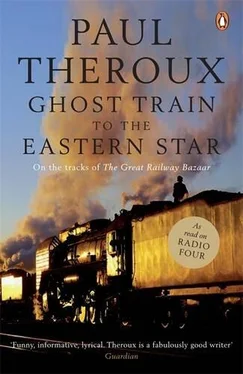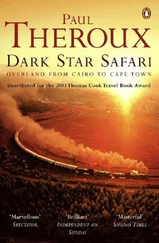Some travel didn't involve locomotion, but instead periods of residence and reflection, a weightless orbiting, as when I became almost invisible and seemed to dissolve, ghost-like again, in an agreeable location, an aromatic version of home, days of work and thought when I remained monkishly in my head, unaware of the exotic — days when I would emerge from my hotel room into a crowded Asiatic lane as though I'd been beamed there as "matter transfer" by a hot light, surprised to see a bazaar and rickshaws and skinny street vendors, pretty girls staring, and I would laugh: What am I doing here?
I'd come to see that travel for me was no longer a fun-seeking interlude, not even the roundabout detour of heading home, but a way of living my life: a trip without an end where the only destination was darkness. The beauty of it was that I was doing it in the simplest way, as a homeless person with a small bag and a briefcase of papers, rubbing across the world, traveling light. The epitome of this was the elderly father of the Jain I had met in Jodhpur, who, after a long career as an accountant, said goodbye to his family and set out on foot to spend the rest of his wandering life seeking enlightenment, or a monk like Tapa Snim in Mandalay, his whole material existence tucked into a bag slung over his shoulder, traveling from country to country to solve holy riddles in his head about the Buddha as a pinecone tree.
In the dining car of this Berlin train, I was making notes on the flyleaf of the book I was reading, one I had bought in Moscow for the onward journey. It was Venus in Furs, but it did not live up to its lurid cover or its reputation as an erotic classic. I ordered bread, fried eggs, and tea (I could still say khlyeb and ya-ich-nitsa and chai).
The rock-faced Russian men pigging it over a messy breakfast at the next table noticed my book. Gesturing with big fingers and smiling, they indicated, How about a closer look at the cover?
The book was passed from horny hand to horny hand, the fat fingers poking at the bosomy torso wrapped in a fur stole. Before they went back to their sausages and their vodka, the men regarded me with widened lips and welcoming teeth.
"You woodka." They were not so much offering me a drink as ordering me to take one, the inevitable Russian challenge.
I took one. They bullied me to repeat it. We toasted peace and friendship. Five shots later, my brain was inflamed. The sun came up, glanced on the snow, slashed through the window, and stung my bloodshot eyes.
"Fryendsheep!" Oleg was saying. His friends were Valery and Alexey. They were steelworkers going to Minsk. They had the dangerous and half-domesticated look of men who'd just been given bad haircuts.
"To money!" I said, attempting a joke.
"No money!" Oleg said. "Money — sheet!"
"To the little children," I said.
"What you are saying?"
"To love," I said.
"Love," they said.
"Bush is rediska " Oleg said with the suddenness of a drunk. " Rediska? "
"Is a bad fruit," Oleg said.
A radish, I guessed, a mildly denigrating euphemism.
"Peace," I said, and was glad when at last the vodka bottle was empty. I was helplessly drunk at nine-thirty on this sunny morning as the train drew into Minsk's bright, cold, and dazzling snow, its pistachio-colored station. I had to lie down. I slept and woke and read the rest of Venus in Furs, written by the man whose name Freud chose to define the desire for pain. Oh, a man must feel like a God when he sees others before him trembling, I read, and thought of the paranoiac Stalin and his gulag.
" Kontrol!" a Polish border guard shouted at Terespol Station as she flung my door open that night. Black leather coat, boots, black gloves: she could have stepped from Sacher-Masoch's novel.
After a peaceful night, " Kontrol!" again, and I looked out the window into the edge of Germany and the first snowless landscape I had seen since Vladivostok.
In the next compartment, a young English couple and their small child were headed for a skiing holiday in the Alps. They asked where I'd been. I'd just come from Perm, I said, and I mentioned the gulag.
"I'd do all right in a gulag," the wife said, sniffing confidently.
"How so?"
"I like being on my own."
I got off at Berlin. It was a whole city now, and rebuilt. The wall was down, and fragments of it were erected as freakish monuments. More sushi bars and pizza parlors and Mexican restaurants and coffee shops, and couples strolling in the sunshine. I went to three museums, and at nightfall, instead of checking into a hotel, I went back to Berlin Hauptbahnhof and caught the Paris Express.
In the most comfortable compartment of the many night trains I had occupied on my trip was a wide bed with a soft duvet, a writing desk, and a bathroom as large as any in a Japanese hotel — with a shower stall and a swing-out sink. I took a hot shower, drank some beer, and went to bed. I woke to green bushes, and trees in bud, and a silvery fog like threadbare silk fraying to scraps and ghosting over the green hedges and plow marks of neatly ruled fields.
The mild morning in Paris was a gilded evaporation of dissolving fog, like a mist of decomposing angels, the sun burning through its essence and beautifying the ornate backdrop of biscuit-colored buildings, revealing the city to me once again as a luminous stage set.
For the sake of symmetry, and because I was hungry and had time to kill, I checked my bag at the Gare du Nord and walked across the street to the Brasserie Terminus Nord. I ordered the same meal that I'd eaten that early evening, months and months ago, before taking the Orient Express to Budapest — bouillabaisse, green salad, a half bottle of white burgundy. Afterwards, I walked a little, and thought: Once a city's boulevards have been marched by triumphant Nazis, they never look quite so grand again. Then I took the Eurostar to London.
I fell asleep and woke after nightfall in Kent, at the far end of the Channel Tunnel, intending to finish this book, which I'd written every day of the trip. In the darkness tonight no images of the past were visible to disturb me. The landscape was shrouded with a veil of forgiveness, and bad memories were buried — like many I'd endured on my trip — in the dark backward and abysm of time. Nothing to remember but my last meal. At the end of my day's notes I wrote the one word, Done.
It's true that travel is the saddest of pleasures, the long-distance overland blues. But I also thought what I'd kept fretting about throughout my trip, like a mantra of vexation building in my head, words I never wrote. Most people on earth are poor. Most places are blighted and nothing will stop the blight getting worse. Travel gives you glimpses of the past and the future, your own and other people's. "I am a native in this world," aspiring to be the Man with the Blue Guitar. But there are too many people and an enormous number of them spend their hungry days thinking about America as the Mother Ship. I could be a happy Thai, but there is no life on earth that I am less suited to living than that of an Indian, rich or poor. Most of the world is worsening, shrinking to a ball of bungled desolation. Only the old can really see how gracelessly the world is aging and all that we have lost. Politicians are always inferior to their citizens. No one on earth is well governed. Is there hope? Yes. Most people I'd met, in chance encounters, were strangers who helped me on my way. And we lucky ghosts can travel wherever we want. The going is still good, because arrivals are departures.












